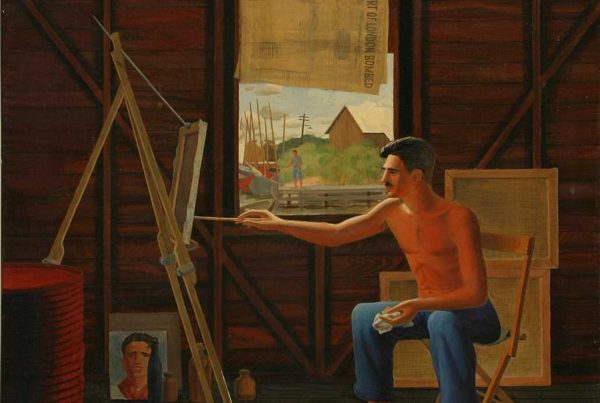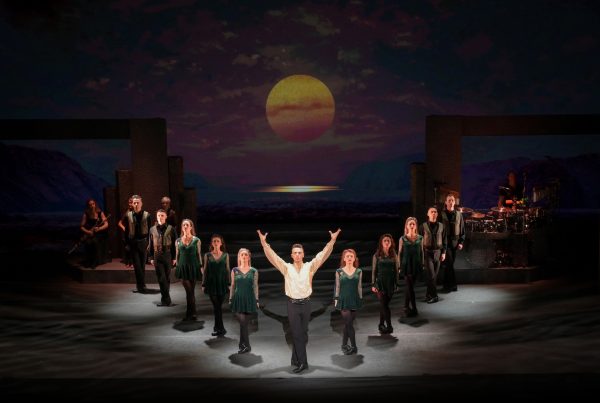
The fun and frivolity suggested by the word “Parade” dissipates within a few scenes of Jason Robert Brown’s sobering, fact-based musical, currently presented in a challenging and provocative production from Boca Raton’s Slow Burn Theatre Company. Even its humorous songs, which are few and far between, are laced with the sort of social critiques that might have turned up in Kurt Weill songs a generation earlier—and performed here like bursts of trenchant folderol where the joke is on us, if there’s even a joke.
By the climax, I felt furious and sickened by what I was seeing—physically nauseated. This is a complement to director/choreographer Patrick Fitzwater and his remarkable cast and his design team, who inject every moment with life-or-death gravitas.
First performed on Broadway in 1998, “Parade” is an account of the trial and wrongful sentencing of Jewish factory owner Leo Frank in the racist, anti-Semitic Atlanta of 1913, for the unspeakable crime of raping and murdering a 13-year-old employee over Memorial Day weekend. The case became a cause celebre for the civil rights movement and eventually spawned the formation of the Anti-Defamation League. In their handling of the case, Brown and his book writer, Alfred Uhry, find the universal through the specific, in this case the power of lingering prejudice through the ages, and our propensity to always blame the Other first, even if it means hurtling to untenable conclusions. “Parade” is about our society’s crazed bloodlust for vengeance, and how it clouds rational inquiry, a theme that grows more relevant with every Nancy Grace-enabled courtroom circus in this century.
Brown and Uhry take their time with this heavy material, easing us into the world of post-Reconstruction Georgia with a pair of surprising opening numbers: the elegiac ballad “Old Red Hills of Home,” sung by Confederate-clothed soldiers, and the more-rousing “The Dream of Atlanta,” neither of which would sound out of place at the Grand Ole Opry. To these soldiers and the other Atlanta denizens, a man like Leo Frank (Tom Anello), who moved down from Brooklyn to take the factory job, is a suspicious carpetbagger. By the time we get to the play’s third song, Leo’s “How Can I Call This Home?,” Fitzwater has begun to delineate his Otherness through his choreography—positioning this well-dressed nebbish navigating a suffocating swarm of Southern vipers that are poised to pounce at the first opportunity.
That opportunity arrives apace with the discovery of the bloodied body of Mary Phagan (Kaela Antolino), who had visited Leo’s office to collect her paycheck on the day in question. This is all that’s needed for the state’s preening governor Slaton (Christian Vandepas), bigoted prosecutor Hugh Dorsey (Matthew Korinko) and the media (epitomized by Vandepas’ uncouth guttersnipe Britt Craig) to build a case against him—all of which is depicted by Fitzwater in a riveting, herculean nine-part trial suite that drifts in and out of song.
If Fitzwater was justly praised for his inspired take on “next to normal” earlier this season, he deserves even more kudos here, working with musical director Manny Schvartzman to cycle through countless tones and textures at the drop of a dime. Only one number doesn’t work: the fishing ballad “The Glory,” in Act Two, which grinds the show to a halt. Otherwise, the music in this “Parade” is a stirring and subversive cocktail: a mint julep of southern gentility spiked with doses of northern jazz, blues, soul and opera. Perhaps the hissy shuffling noises audible from some of the microphones at last night’s show reflects the difficulty of pulling off such ambitious material without a hitch, but it could have just been an off night.

At any rate, the actors soldiered through it marvelously, with not a weak link in the cast of 16. Korinko is scarily effective as the play’s most despicable character, plumbing darker corners of the human psyche than he ever explored as Sweeney Todd last year. As the newly childless mother Mrs. Phagan, Kaitlyn O’Neill delivers the heartbreaking courtroom lament “My Child Will Forgive Me,” a moment of genuinely affecting truth amid a collage of deceit. And Jerel Brown delivers a star-making turn in three vividly realized supporting roles.
Anello is a solid Leo Frank, making the best of a role that, while central in the historical narrative, offers little room for theatrical expressivity. We get more of this from Ann Marie Olson as his wife Lucille, whose relationship to her husband deepens and strengthens over the course of his incarceration. This sense of renewed romance is vital during the second act, because it prevents the story from being almost unwatchably dour, and Olson and Anello find the beauty in their characters’ growing attachment. By the time they embrace at the end of “All the Wasted Time,” they’ve capped one of the most real and uninhibited expressions of pure love I’ve ever seen on a stage.
The world is a nasty, backward and criminal place in “Parade,” but this moment shows us that there is still some light.
Slow Burn Theatre Company’s “Parade” runs through Feb. 9 at West Boca Performing Arts Theatre, 12811 Glades Road, Boca Raton. Tickets cost $25 to $40. Call 866/811-4111 or visit slowburntheatre.org.







